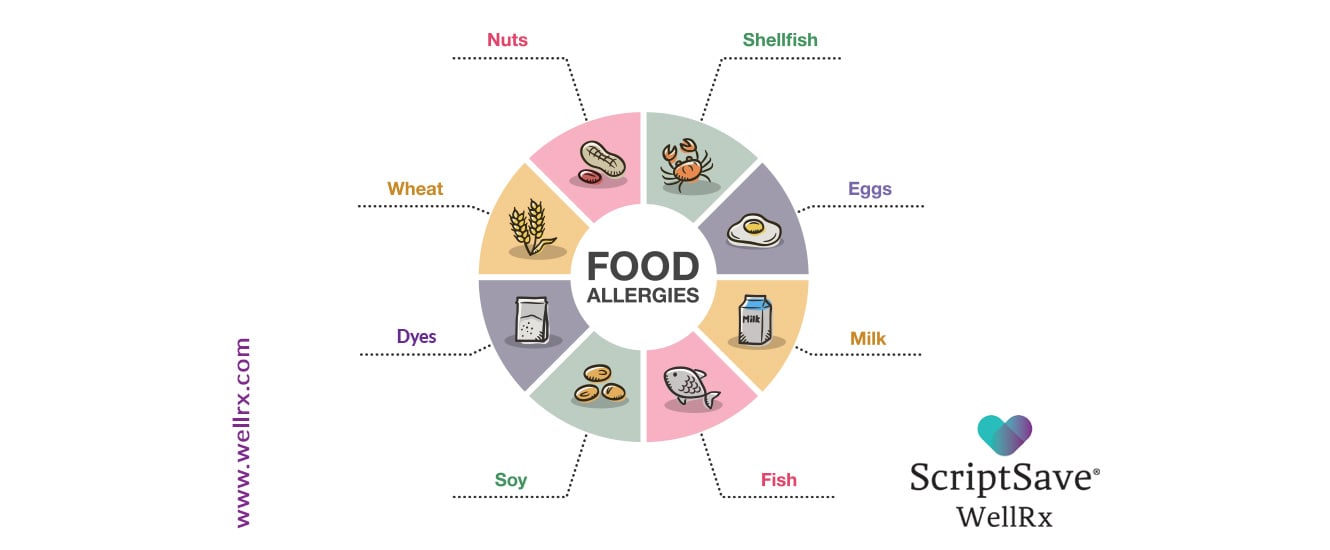Nearly 20% of Americans have self reported an allergy to a medication and roughly 4% of the nation suffers from some form of food allergy.1 While it would seem obvious to avoid something if you’re allergic to it, you’d first have to know you’re allergic. When it comes to medications this can be challenging.
There are different grades to an allergic reaction. It could be as mild as some pesky itching or a cough; a more serious fever, rash or painful blisters; or very serious blood irregularities, difficulty breathing or death.2,3 Allergic reactions can occur within many different classes of medications such as antibiotics, antidepressants, anesthetics, narcotics, nonsteroidal anti-inflammatory drugs (NSAIDs), among others.1
Excipients – Crucial for Drug Delivery
When you take medication, there is more than just an active drug inside the tablet, capsule, spray or syrup; these additional “inert” products are called excipients4. Excipients play a variety of roles in medications. They are used to stabilize the active drug, bind the active drug(s), increase the solubility, enhance or delay absorption (such as enteric coated tablets), and provide flavor or sweetness.4 Some excipients come from foods that people have an allergy to. The most common food allergies in the United States are milk, egg, peanut, soy, fish, and gluten.5 The Food Allergen Labeling and Consumer Protection Act (FALCPA) was enacted to inform patients if a major allergen was in their food, even in trace amounts. This carries over to medications, however, this information comes and stays with the original bottle, it will not be transferred to the prescription label. These food and drug allergies are why the pharmacy will ask for your allergy information when creating your profile and before dispensing any medications. Different manufacturers use different excipients in their preparations, so you may be allergic to one brand and okay to take a different brand. If you would like to know if an allergen is in your prescription, ask your pharmacist.
Milk: Milk allergy, sometimes called lactose intolerance causes discomfort in the digestive tract whenever dairy products are consumed. There are other enzymes in milk that people may be allergic to such as casein. Lactose is used as a stabilizer in some asthma inhalers and as a filler (excipient) in some tablets. Other milk products can be found in TUMS smoothies, as well as some vaccines, so be sure to ask your doctor or pharmacist to avoid an allergic reaction.5,6
Egg: Those with an egg allergy should be cautious of vaccines that use egg as a stabilizer and certain hospital drugs for intravenous use as some patients have had an anaphylactic reaction. The CDC has said that the Flu vaccine is safe, even in people with an egg allergy but there are egg-free versions of the vaccine available. IV Benadryl and the sedative propofol are two medications that contain egg. Again, make sure any health care professional that considers you a patient knows your allergy history as it is important for your safety.5,6
Peanut: Peanut is a well-recognized allergy alert and as such is not found in many medications. The package inserts for progesterone capsules and valproic acid capsules have peanut as an ingredient. Dimercaprol lists peanut oil and there is peanut oil in some asthma inhalers and the topical medication fluocinolone.6 There are alternatives to any of these medications for anyone with a peanut allergy that would also need one of these medicines.
Soy: Soy can be listed as soy or as one of its derivatives – lecithin. Again, it can be found in some inhalers and propofol5. Some over the counter products I’ve discovered that have soy are Advil liquid-gels, TUMS smoothies, and black cohosh (an herb sometimes used to treat perimenopause and menopause symptoms). Be sure to read the ingredient list when choosing an over the counter medication or ask your pharmacist if you are unsure if an allergen is in a product.
Fish: Fish products can be found in some (not all) multi-vitamins and supplements, which highlights the importance of reading labels. A reversal agent for the anti-coagulant heparin called protamine contains some derived fish products. NPH insulin also contains some fish oil, so diabetic patients with a fish allergy needing a short acting insulin could choose a different insulin.3,5 There are case reports of patients with a fish allergy trying fish oil and not experiencing a reaction, if you would like to try the fish oil test then ask your doctor.
Dyes: One final excipient that causes a reaction in some patients is medical dye. Most specifically FD&C Blue 1, Blue 2, Red 4, and FD&C Yellow 5. These colors can be used in many different medications, your doctor or pharmacist would need to check to ensure these dyes aren’t in any of your medications7.
This is not a complete list of possible allergens or medications that may contain allergens. If you have ever experienced a reaction to a food, medicine, or dye be sure to inform your primary care doctor, pharmacist, and any specialists that you see. Document your reaction so that you can remember what happened if a health professional asks you about your allergy. Questions about possible allergens can be answered by your prescriber, pharmacist, poison control center, or manufacturer of your medication so never hesitate to call and ask. Any patient that has ever experienced an anaphylactic reaction should wear a bracelet advertising the allergy.
References
- Macy E, Ho NJ. Multiple drug intolerance syndrome: Prevalence, clinical characteristics, and management. Ann Allergy Asthma Immunol2012; 108:88–93
- Stevenson, DD. Sanchez-Borges M. Szczeklik, A. Classification of allergic and pseudoallergic reactions to drugs that inhibit cyclooxygenase enzymes. Ann Allergy Asthma Immunology 2001; 87:177
- Demoly P, Adkinson NR, Brockow K, et al. International Consensus on Drug Allergy. Allergy 69:420-437, 2014
- Lesney, Mark S. More than just the sugar in the pill. Today’s Chemist at Work. 10(1): 30–6, 2001
- Kelso JM, Davis C. Food Allergy Management. Immunology and Allergy Clinics of North America 2018; 38:53-64
- Kelso JM. Potential food allergens in medications. Journal of Allergy and Clinical Immunology. Jun 2013; 133(6):1509-18
- Swerlick RA, Campbell CF. Medication dyes as a source of drug allergy. Journal of Drugs in Dermatology. Jan 2013; 12(1):99-102
If you’re struggling to afford your prescription medications,
visit www.WellRx.com to compare the cash price at pharmacies near you.
You may find prices lower than your insurance co-pay!













 Store & manage your medication list
Store & manage your medication list Medication pricing updates
Medication pricing updates Pill & refill reminders
Pill & refill reminders Medication journal & mood log
Medication journal & mood log